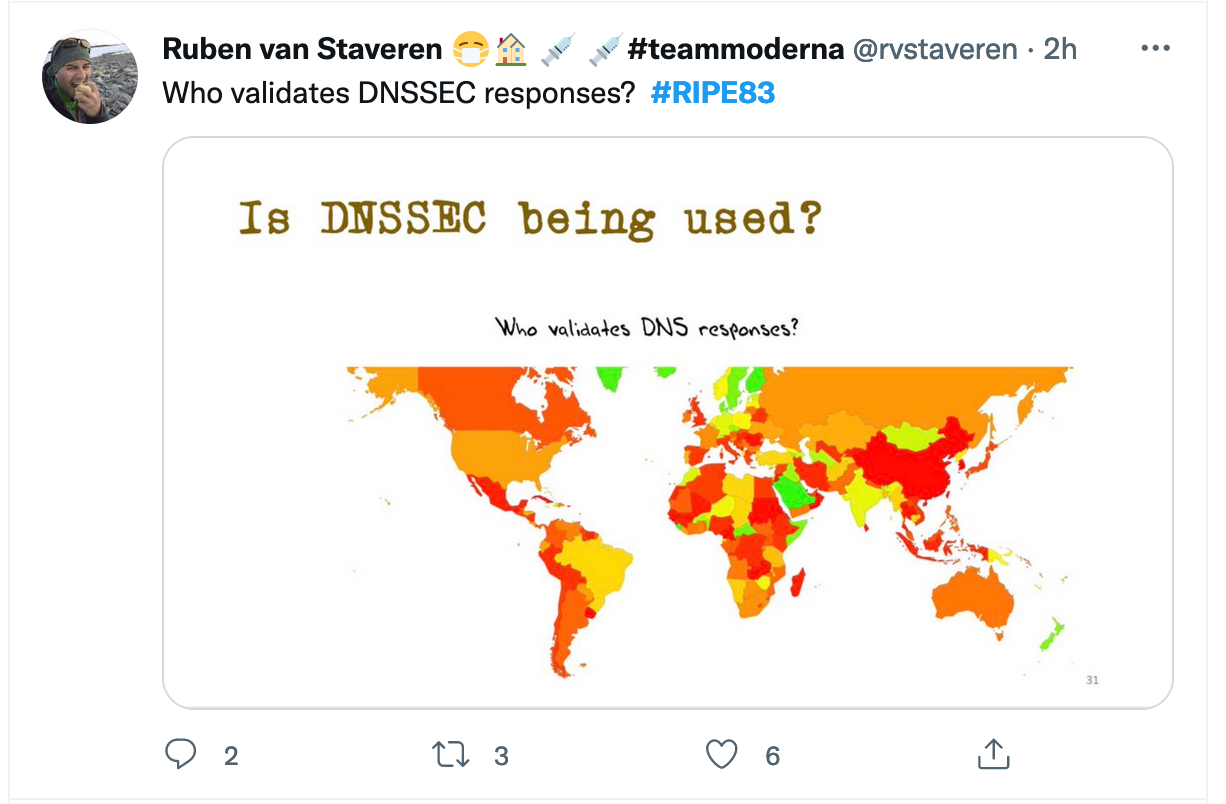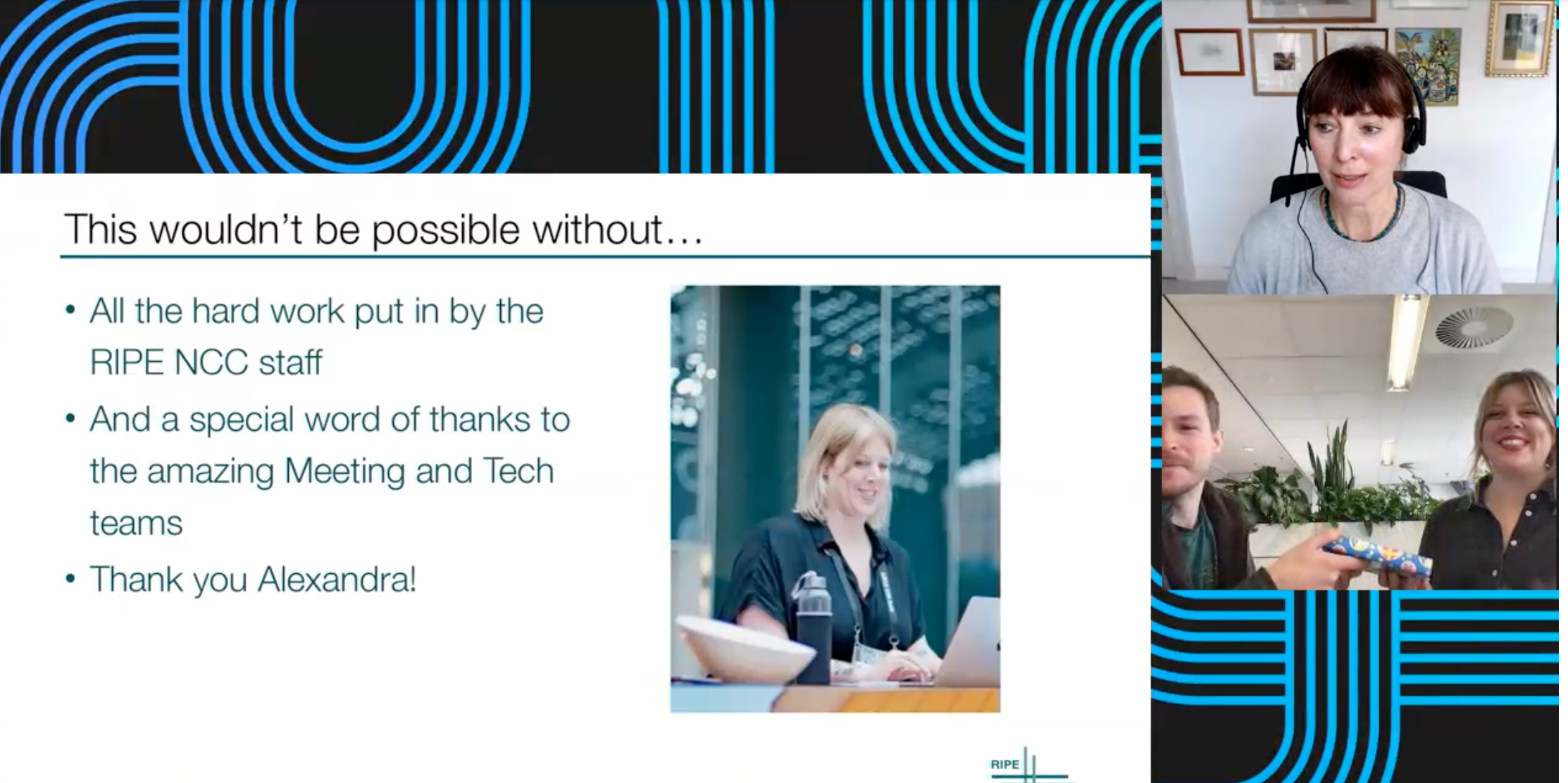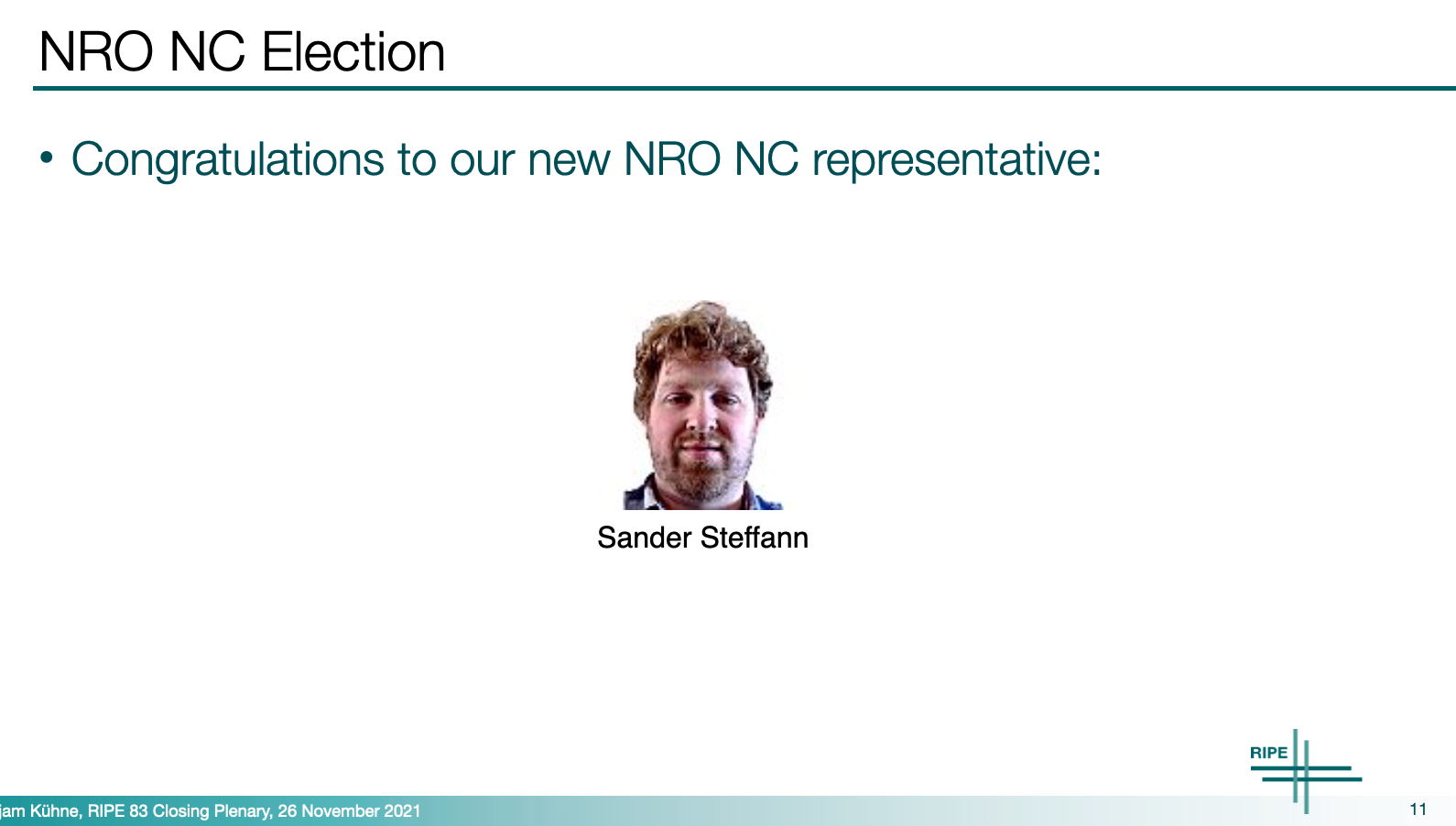- Monday, 22 November
- Tuesday, 23 November
- Wednesday, 24 November
- Thursday, 25 November
- Friday, 26 November
Monday, 22 November
The first day of RIPE 83, our fourth virtual RIPE Meeting, welcomed 1036 registered participants from 84 countries.
Mirjam Kühne, RIPE Chair, welcomed all participants and noted that they had a new RIPE Code of Conduct in place for this meeting. She also mentioned that a new revised PDP Document had been shared on the ripe-list, and that the RIPE Database Requirements Task Force had published its final report. Mirjam also thanked outgoing NRO NC member Nurani Nimpuno for her hard work.
Giovane Moura presented on responsible disclosure of bugs, while Alexandre Ferrieux gave an overview of a troubleshooting methodology they had developed for QUIC.
The plenary sessions saw presentations from Dr. Corinne Cath who presented her PhD research on the IETF’s culture in Internet governance, Sheikh MD Seum who shared his work on providing affordable Internet in Bangladesh, and Michael Oghia who advocated for better sustainability practices in the ICT industry.
Alexander Isavnin gave an update on Russian regulatory practices that are intended to ensure the nation’s Internet sovereignty.
The afternoon plenary sessions continued with Clemens Mosig, who presented a joint research project that raised the question of whether there was a need for new BGP Route Flap Dampening configurations. He was followed by Emile Aben, who measured latency into networks using the geographical data of RIPE Atlas probes.
After a well-deserved stretch break, Andra Lutu presented insights from an analysis on operating an IP Exchange Provider. She presented signalling data sets, traffic patterns and international mobility patterns. Max Franke was up next with a talk on new ways to use Happy Eyeballs for load balancing. Finally, Randy Bush presented on the downsides of dropping Invalids when running BGP Route Origin Validation and offered three solutions to this problem.
The day ended with the Time to Talk social event where attendees could meet with key RIPE community members and the RIPE NCC Executive Board on SpatialChat.
Our favourite tweets (and slides) of the day:
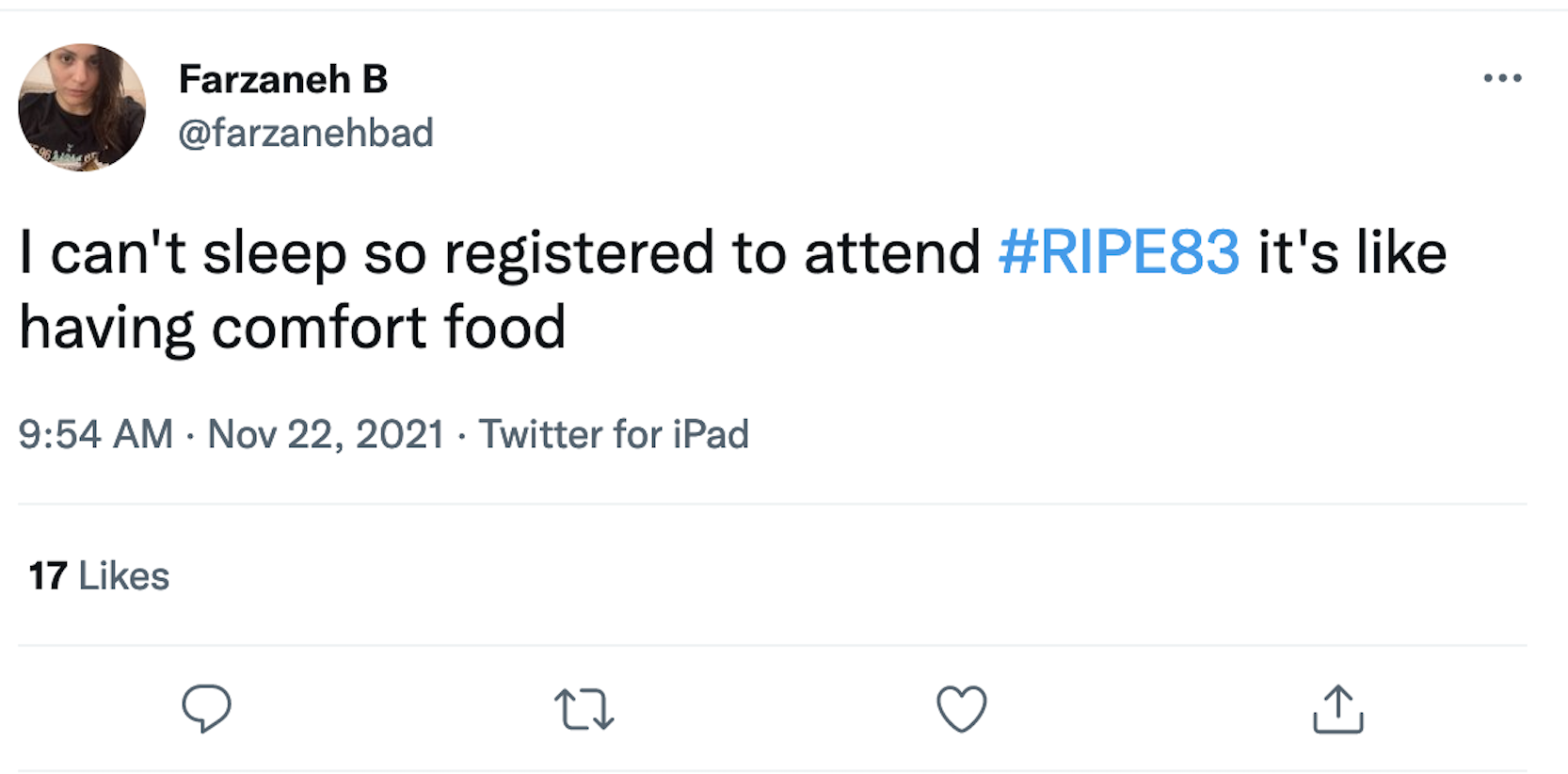
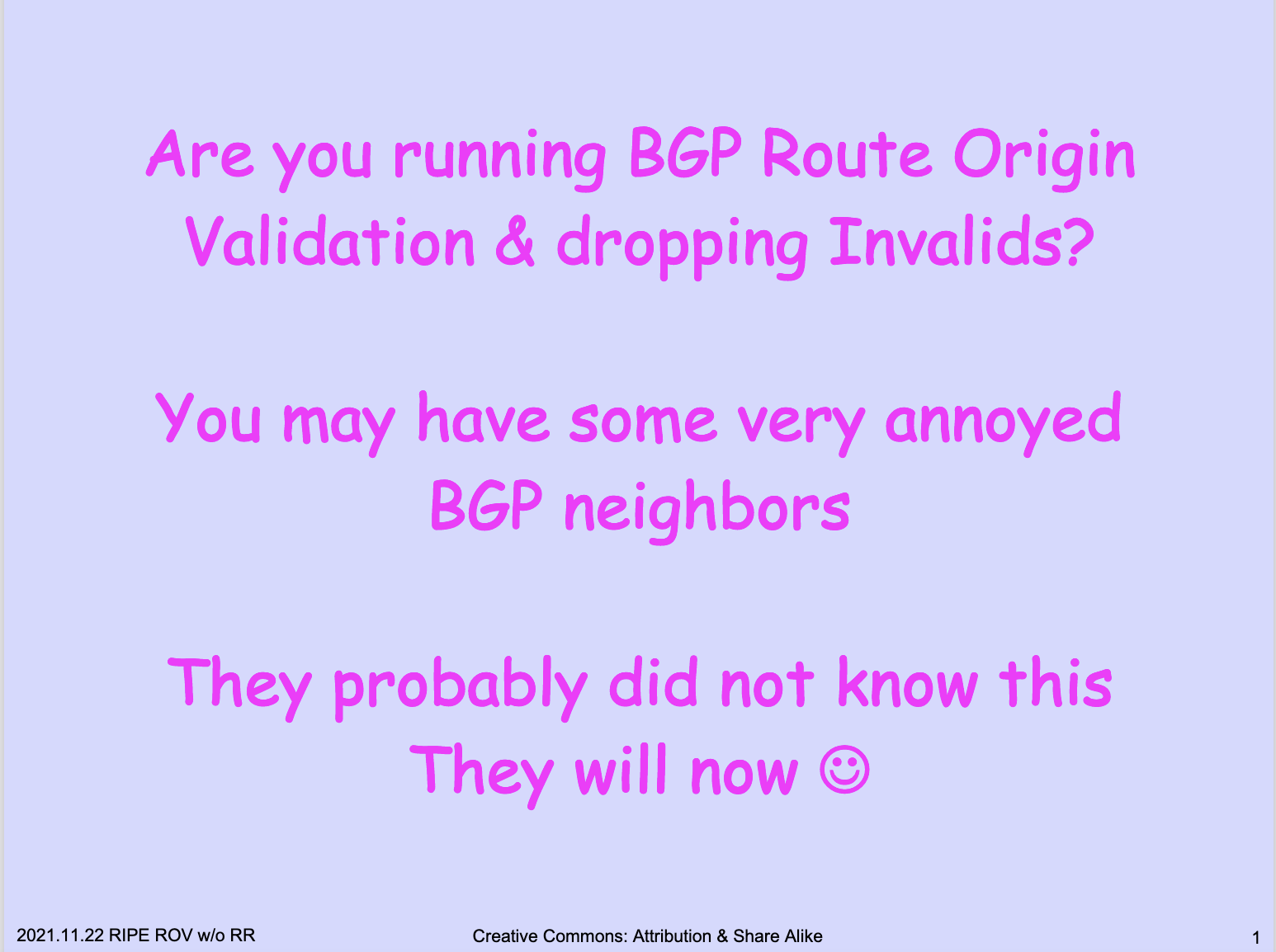
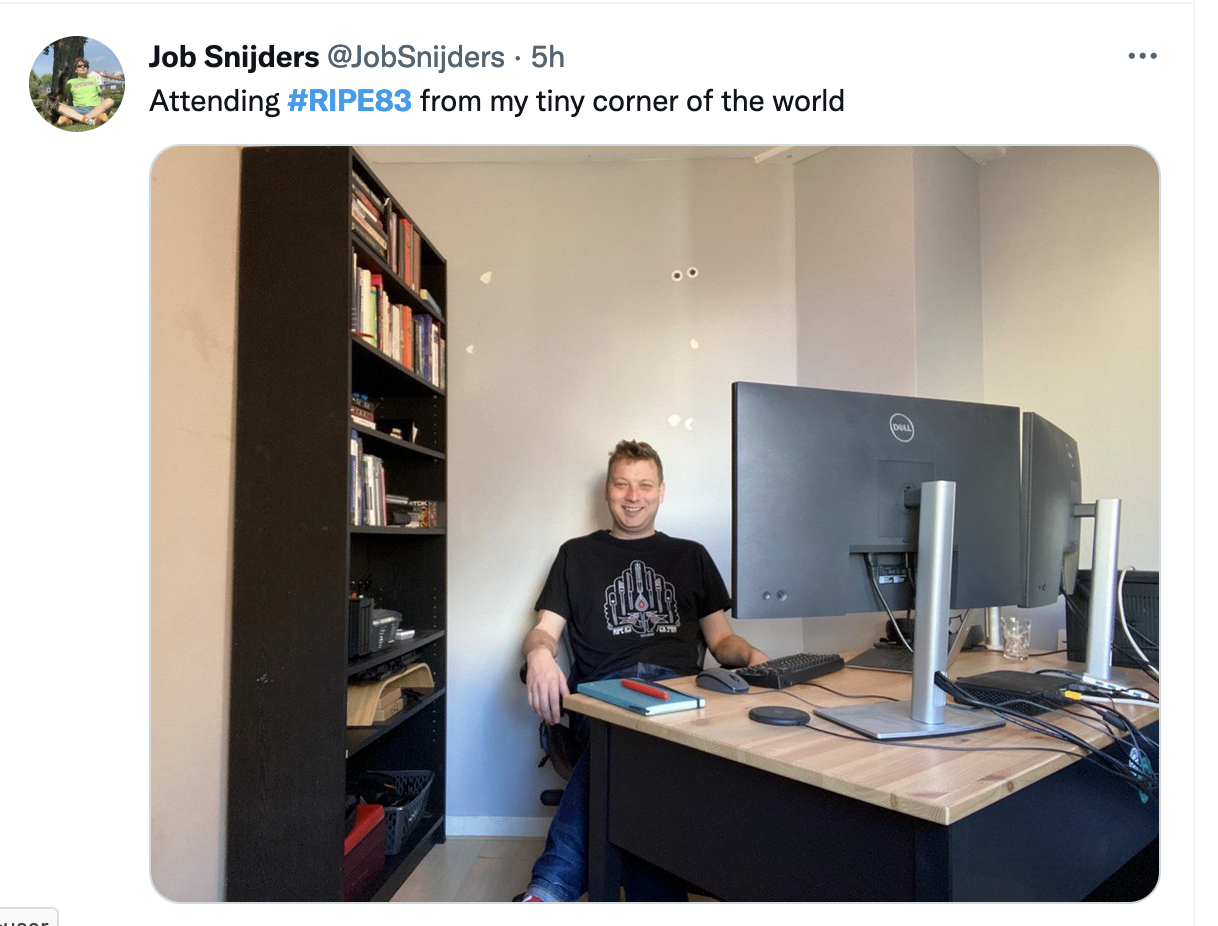
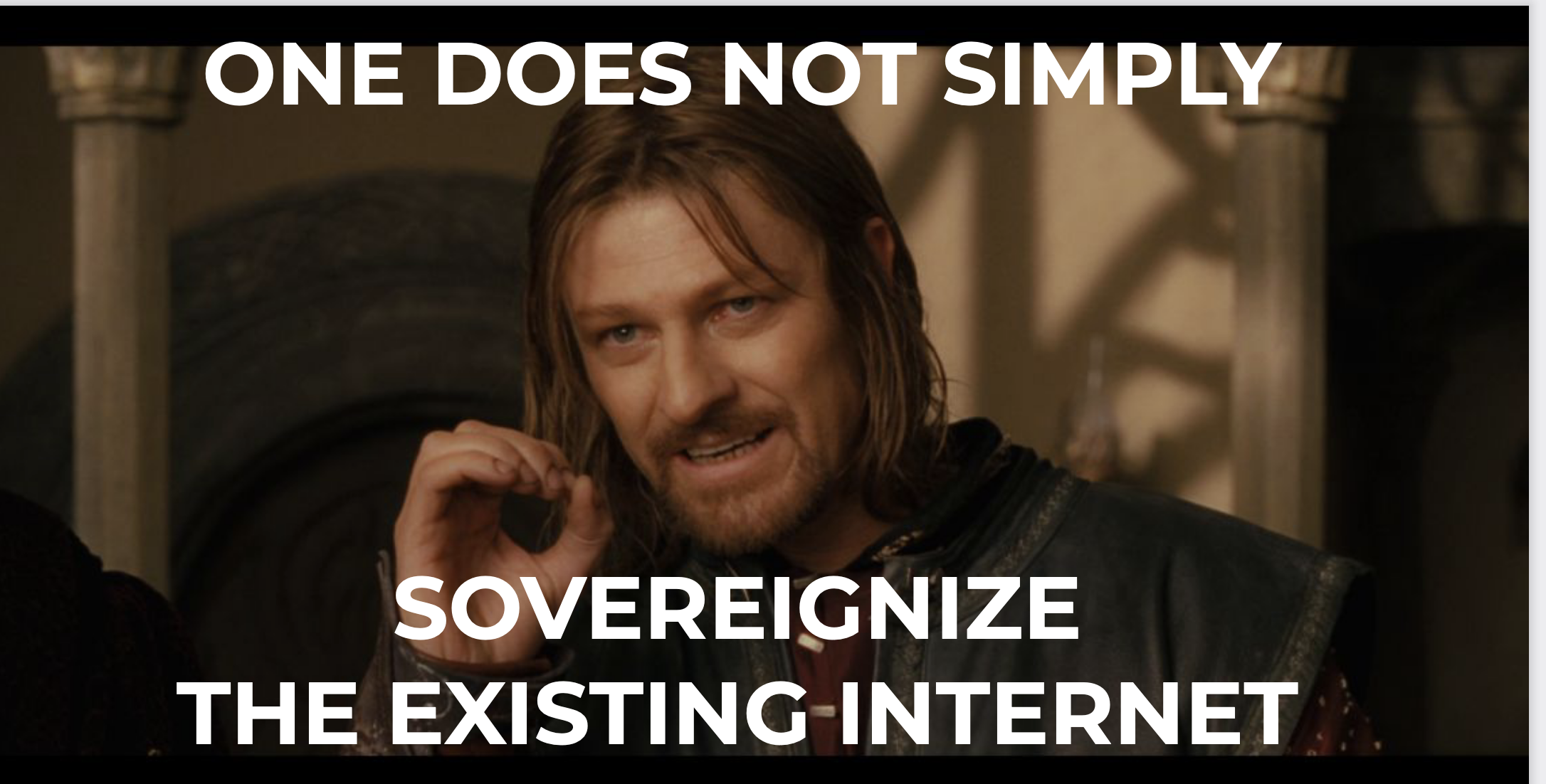
Tuesday, 23 November
On the second day of RIPE 83, we welcomed 1,085 registered participants to the RIPE Working Group (WG) sessions. We also held a BoF session on technical training at the RIPE NCC where community members got to share their feedback.
The day kicked off with the Address Policy Working Group session. Hervé Clement explained what the ASO AC is up to. Following up on this, Ulka Athale (RIPE NCC) presented the candidates for the upcoming NRO NC elections. Next, Angela Dall’Ara gave an overview of new RIPE policies as well as policy discussions in other RIRs. Hans Petter Holen (RIPE NCC) provided an update on the AFRINIC case.
Marco Schmidt (RIPE NCC) offered a Q&A about the RIPE NCC Registry Services. James Kennedy of the ASO AC also got everyone up to speed on the RIPE Database Requirements TF. After a short break, Leo Vegoda went over current RIPE IPv6 policy goals.
In the Routing Working Group, Pavlos Sermpezis (Aristotle University) presented DataLabs’ research estimating the impact of an ongoing routing hijack. He shared best practices for measuring a hijack and mentioned some of the problems with public Internet measurements. Next, Ties de Kock (RIPE NCC) gave an update on the RIPE NCC’s quarterly plans for RPKI. Martin Hutchinson (Google) presented on certificate transparency and shared a framework that community members can use to design similar systems. Last but not least, Pim van Pelt shared his experience while renumbering his Autonomous System (AS).
At the IoT Working Group session, Elsa Turcios Rodriguez presented on a research collaboration with an ISP that looked at user compliance and remediation after IoT malware notifications. The researchers looked at three groups: consumers in a walled garden, users notified by email and a control group. She noted that in the walled garden group, 92% of the issues were cleaned up, versus 82% in the email group. And if the user’s device was infected with competing malware, this reduced the probability of remediation by 54%.
The next presentation came from Marco Hogewoning, who provided an update on legislative and political developments that affect the IoT space. He spoke about recent EU legislation and considered what role the RIPE community could play in potentially steering alignment and best practices as many countries seek international standards on IoT matters.
This segued nicely into the next session with the Cooperation Working Group, which saw a lively discussion on Internet governance. The chairs noted the ongoing Working Group co-chair selection and invited nominees for the role. Chris Buckridge (RIPE NCC) explored the value of principles for the RIPE community and for Internet governance generally. He produced a preliminary outline of suggestions for what principles define the community.
Next, Suzanne Taylor (RIPE NCC) explained what’s happening with NIS 2 and the implications it may have for operators of root name servers. She explained what her team is doing to influence policy in this area and shared their success with persuading the EU Parliament to exclude root name servers from their legislation. In the final talk of the session, Anriette Esterhuysen (UN Internet Governance Forum Multistakeholder Advisory Group) gave an update on the IGF ahead of its upcoming meeting in December. She explained the purpose and goals of the IGF and some of its upcoming plans.
The day concluded with a BoF session on the future of technical training with Evelien Schilder, Pedro Vaz, Gerardo Viviers and William Johnson (RIPE NCC). They spoke about the training goals of the Learning and Development department at RIPE NCC and invited feedback from the community on what types of training they would be interested in going forward. The audience shared their experiences and their suggestions for the training team.
Please note that there will not be a PC vote at this RIPE Meeting. As there were only two candidates, the PC will instead confirm the names on Friday morning.
Our favourite messages (and slides) of the day:
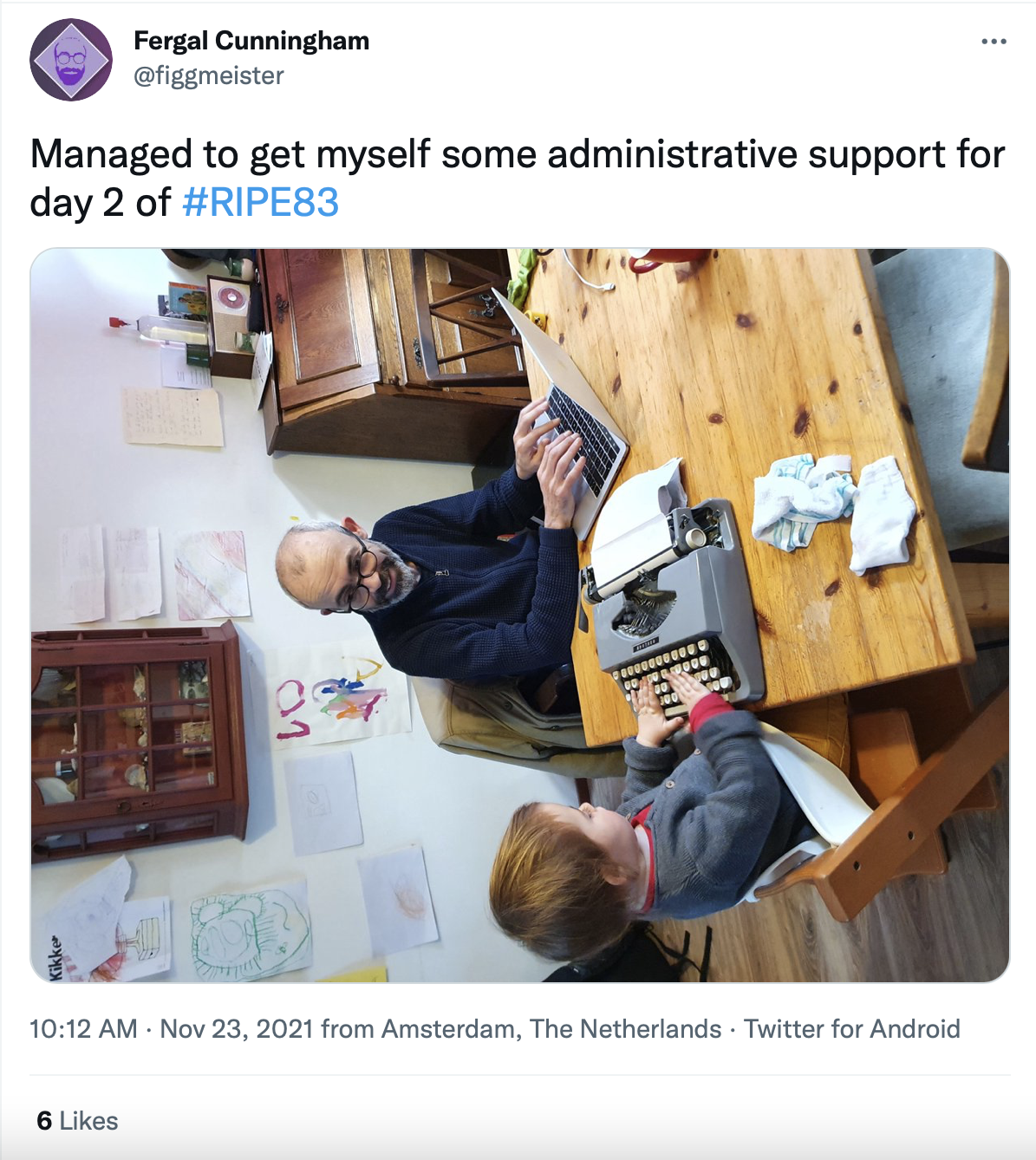
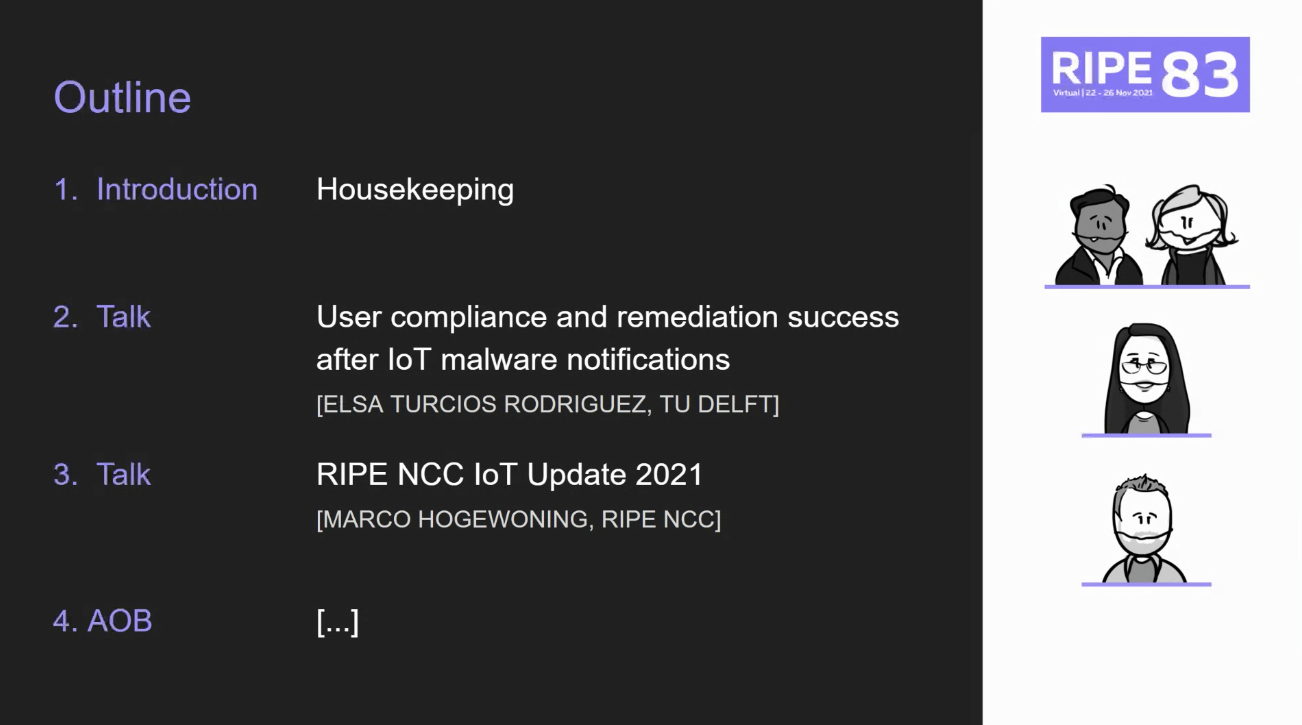
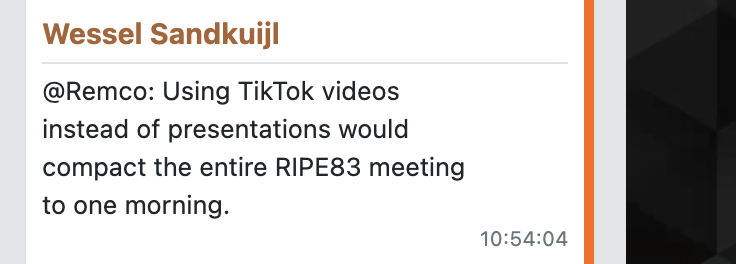
Wednesday, 24 November
Wednesday was all about the RIPE Working Group (WG) sessions – here’s a summary:
Anti-Abuse WG
- The WG session opened with the confirmation that Tobias Knecht would continue as co-chair alongside Brian Nisbet, while Alireza Vazin would step down – Brian thanked Alireza for his work as co-chair.
- Gerardo Viviers, RIPE NCC, started a discussion about the RIPE NCC’s efforts to implement training activities relating to abuse handling which were strongly supported. This was followed by a presentation from Denis Walker on the purposes of the RIPE Database, particularly from an abuse handling perspective, now and going forward.
- The session finished with a presentation from Tianxiang Dai of Technische Universität Darmstadt, who looked at abuse activities in which various types of Internet resources are taken overand at the best strategies for mitigating these risks, which provoked some wide-ranging discussion.
Database WG
- Edward Shryane, RIPE NCC, kicked off the session with an overview of the new features implemented in the RIPE Database since RIPE 82 and the upcoming features. He reported on the WHOIS outages that took place and the data cleanups that were performed. He also gave a status update on the cloud migration project.
- Rehan Syed, RIPE NCC, presented a retrospective of the RIPE Database User Interfaces (UI) from 2014 to today. He then presented the upcoming UI changes for the WHOIS interface. Finally, Rehan asked for volunteers to participate in usability testing and to share feedback on the UI of all RIPE NCC services.
- Shane Kerr, a member of the RIPE Database Requirements Task Force, presented on the work that has been done by the task force and highlighted the main points of the task force’s final report.
- The session ended with Denis Walker, co-chair, who followed up on a video he had previously shared to ask for input from the community about the purposes of the RIPE Database.
RIPE NCC Services WG
- The WG session started with Hans Petter Holen, RIPE NCC’s Managing Director, giving an update on the RIPE NCC’s major activities and projects, including the strategy and action plan, the budget and a preview of 2022 priorities. He highlighted a few projects in particular, including the RIPE Registry, AuthDNS, RIPE Atlas, the RIPE NCC Community Projects Fund, e-learning services, the latest RIPE NCC Internet Country Report, language support and sanctions. Hans Petter answered many questions about sanctions and what the RIPE NCC could do to ensure that all members can receive services.
- Felipe Victolla Silveira, RIPE NCC’s Chief Operating Officer, gave an update on the re-evaluation of the RIPE NCC’s cloud strategy after receiving a lot of feedback on the initial proposal, including during two RIPE NCC Services interim sessions. He gave an overview of the new strategy, which was approved by the RIPE NCC Executive Board in September and published on RIPE Labs, but which is still missing a complete framework on criticality. He presented a draft criticality framework and asked for community feedback before publishing a final version.
- Felipe continued with the RIPE NCC operational update that touched on the increase in the workload over the past two years and the impact on the ticketing system waiting times. He also talked about the accuracy of the registry and what has been done to ensure a good quality of service. Finally, he shared an update on the efforts being made to improve the Resource Public Key Infrastructure (RPKI) and the repositories.
- Bijal Sanghani, a member of the RIPE Database Requirements Task Force, gave an update on the task force’s final report and the work that needs to be done by the community and the RIPE NCC to review and implement the task force’s recommendations.
- Rob Evans ended the session welcoming Bijal Sanghani back as a co-chair of the WG.
The day ended with the General Meeting for RIPE NCC members.
Tomorrow, we will start Day Four with the RIPE Community Plenary at 10:30 (UTC+1) – see you there!
Our favourite tweets (and slides) of the day:
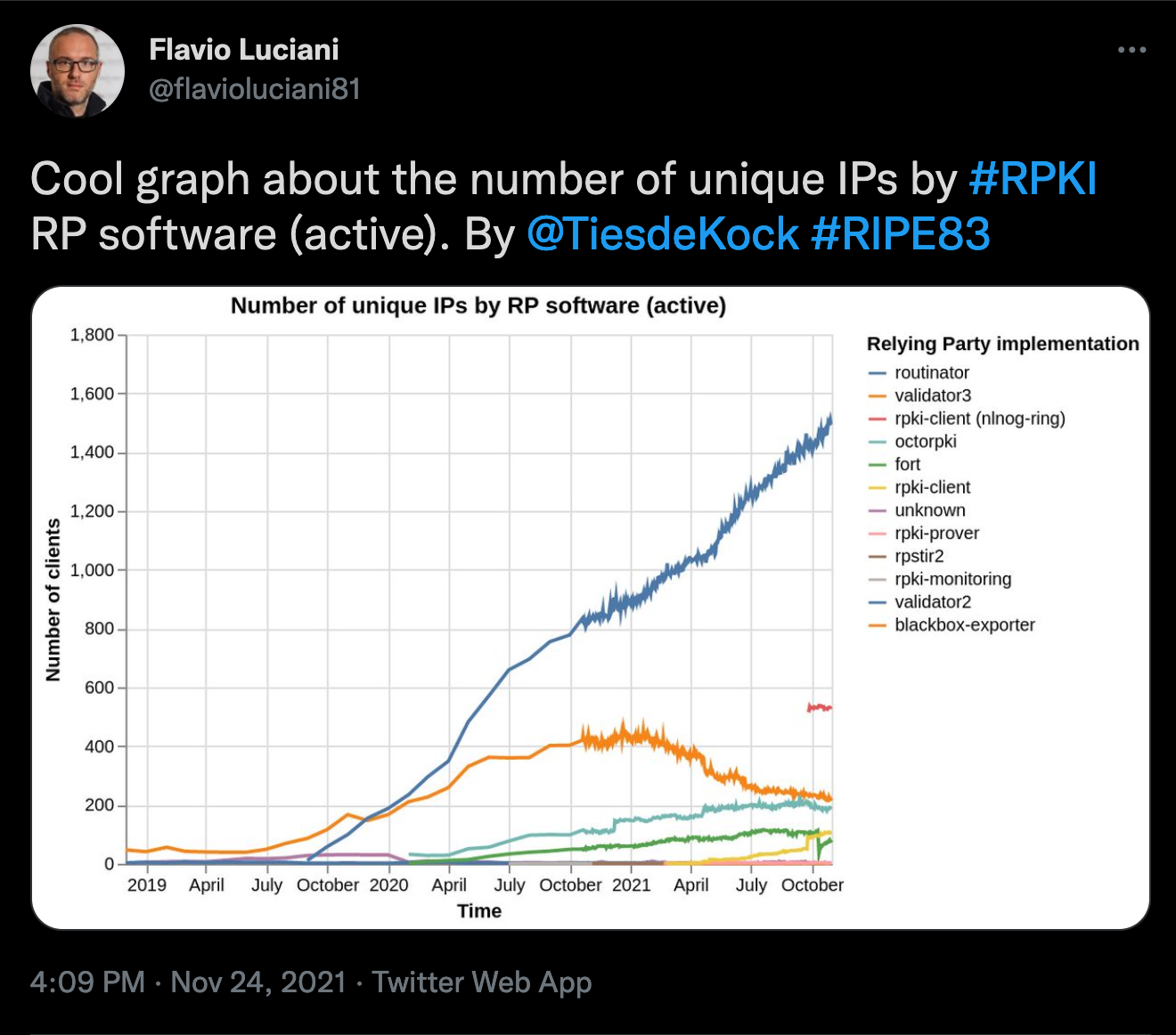
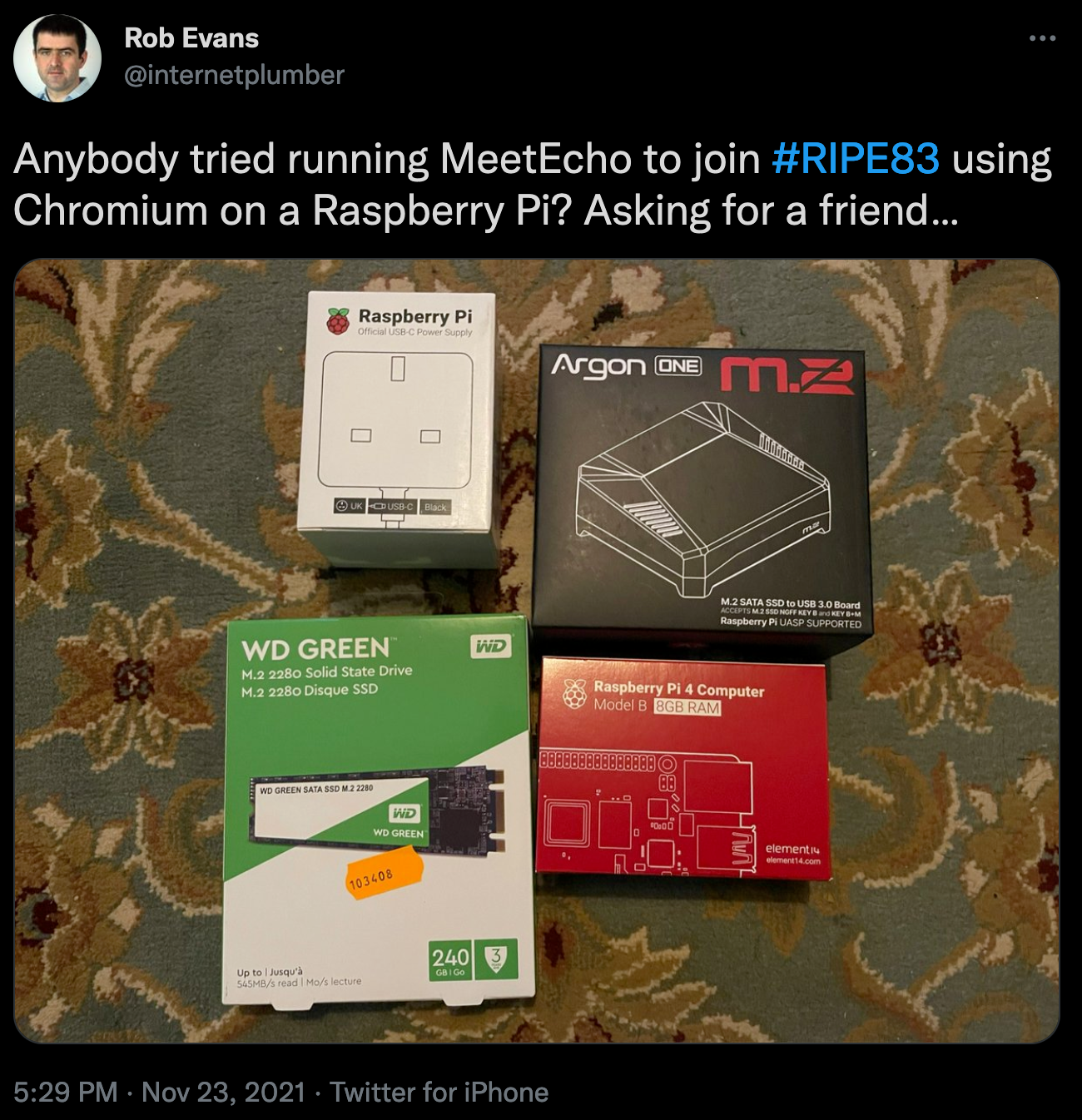
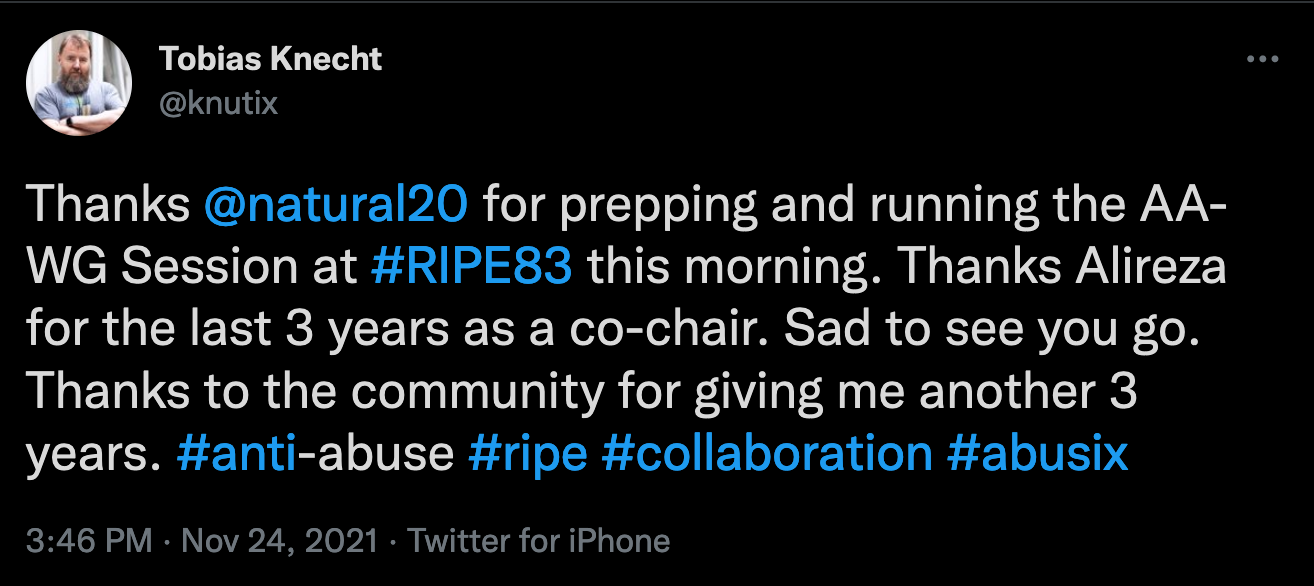
Thursday 25 November
Thursday began with the Community Plenary and continued with a day of RIPE Working Group (WG) sessions.
Community Plenary
- Mirjam Kuhne gave an update from the RIPE Chair team. She mentioned that one of their goals was to make the RIPE community more visible and accessible to newcomers – one thing they’d done was to reach out to the WG Chairs and ask them to record a video introducing their WG. They had also been doing outreach to other groups and were also working with the RIPE NCC to make the community sections more visible. She noted that a draft document on Task Force Definition and Guidelines had been sent to the RIPE list as well as a draft update to the RIPE PDP.
- Eileen Gallagher and Casten Schiefner announced that nominations for the Rob Blokzilj award were now open. Nominations close on 18 March 2022 and the winner will be announced at RIPE 84 (hopefully at a physical meeting in Berlin!)
- Hisham Ibrahim gave a presentation in his new role as RIPE NCC Chief Community Officer. His top-three priorities: Institutionalise understanding of the local community needs in our service region, restructure teams and the RIPE NCC’s presence to make a bigger impact and build ecosystems around the RIPE NCC’s data services.
- Hans Petter Holen followed with a quick NRO update on this valuable vehicle for inter-RIR cooperation. He noted that everything is stable and highlighted a number of NRO projects including a review of its MoU, an NRO Strategic Review and a review of the ASO.
- Mirjam presented on a draft updated PDP document that had been sent to the RIPE list. There were a few comments, notably about whether the PDP should be used to update the document that describes the PDP – at time of writing this is being discussed on the list.
IPv6 WG
- Nico Schottelius, ungleich, discussed the technical details of how to set up IPv6-only networks which need to incorporate IPv6 incompatible devices (such as x-ray or ultrasound scanners, LoraWAN gateways, printers and power plants) by setting up IPv4 ‘islands’ for those devices.
- Nico continued with a second presentation and asked participants for their opinion on Unique Local Addresses (ULA) and how – or even whether – the community should establish a ULA registry, which garnered a fair bit of discussion about the merits of ULA vs. IPv6 in closed networks.
- Lastly, Jan Žorž, 6connect, presented an overview of efforts to update ripe-554, the RIPE Document that lays out requirements for IPv6 in ICT equipment, and the various updates and additions to the document. He asked whether there was consensus on the draft updated policy, which he stressed was badly needed and this sparked a lot of discussion.
Open Source WG
- Ondřej Caletka, RIPE NCC, kicked off the session by going under the hood of the RIPE NCC’s ‘IPv6 Security’ training virtual lab environment. He explained that Virtual Machine (VM) was selected as a solution to keep e-learning affordable, accessible, and easy to use. He reported on the challenge of finding one VM technology supported on multiple operating systems and noted that everything was based on Open Source and publicly available on GitHub.
- Annika Hannig, DE-CIX, took us back five years when ‘Alice’ Looking Glass was first developed as a project at the RIPE NCC Hackathon. Since then, Alice has been deployed on many IXPs, and many new features have been added. Future plans include maintenance and code clean-up.
- Libor Peltan, CZ NIC, gave us a peek into the modern TCP stack for DNS on top of XDP. This was very well received by the participants in the chat, who complimented him on the neat solutions, and pointed out similar work by other research organisations.
- The session finished with a presentation from Marcos Sanz (DE-CIX) who was introduced as an additional WG Chair. He shared his vision and motivations for serving which included giving back to the community, bringing new energy to the team and helping guide the FLOSS projects.
Connect WG
- Pierre Gronlier, Gaia-X, explained the goals, model and reference architecture of Gaia-X. He presented on a service that lets the association issue certificates of membership, and a compliance service to validate the self-description of the first lighthouse projects.
- Leo Vegoda, Euro-IX, introduced the IXPDB which collects public information shared by IXPs. He explained that they are working on a new publication platform to handle the large growth they’ve experienced and that it is expected to launch next year. He also walked participants through the roadmap for new features.
- Bijal Sanghani, Euro-IX, presented IXP updates from DO-IX, DE-CIX, InterLAN, LU-CIX, CATNIX, LINX and INEX. She also introduced the latest Euro-IX patron: FlexOptics. Finally, she invited IXPs using IXP manager to export their data to IXPDB.
- To finish the session, Yolandi Robinson, NAPAfrica highlighted that businesses need to do more connectivity management themselves instead of outsourcing this to a transit provider, and how they need help navigating the complex landscape of IXPs and peering. She introduced a Peering Toolbox as a one-stop shop to provide guidance and invited the community to send links to materials for the toolbox.
DNS WG
- It was David Knight’s last session as co-chair of the DNS WG as he recently stepped down from his role. He was thanked by his co-chairs and the community for his work. João Damas and Shane Kerr announced that Moritz Müller will replace him as the third co-chair of the WG.
- Pieter Lexis, PowerDNS, presented on the PROXY v2 protocol, a binary protocol that prefixes proxied data.
- Geoff Huston, APNIC, presented measurements on RSA 4096 validation in light of quantum computing. He pointed out that in the end it’s not about the key itself but how frequently you roll it.
- Peter Thomassen, Secure Systems Engineering, talked about the Public Suffix List (PSL). which informs about organisation and policy boundaries in the domain space and is maintained by the community (on GitHub). He asked the audience if there was any interest in making it a permanent service.
- Anand Buddhdev, RIPE NCC, gave an update on DNS activities. This included the recent revamp of AuthDNS. Anand mentioned that it is now possible to apply for both K-root and AuthDNS. He also encouraged the community to host an instance of AuthDNS outside of Europe to improve the quality of the network.
- Finally, Petr Špaček, ISC, gave an update on the BIND 9.16 resolver speedup.
MAT WG
- George Michaelson, APNIC, gave an overview of economy-level findings of ‘bad traffic’ using the Dashboard for Autonomous System Health (DASH), highlighting persistent and transient clusters of suspicious activity originating from various locations.
- Robert Kisteleki (RIPE NCC) provided an update of RIPE NCC activities in the area of measurements and tools. This included a list of notable recent RIPE Labs articles, and ongoing developments in RIPE Atlas, RIPEstat, RIPE IPmap and RIS.
- Massimo Candela, NTT, gave an overview of the open-source BGPalerter tool, including background information on the tool, how to access it, and a detailed step-by-step example use case.
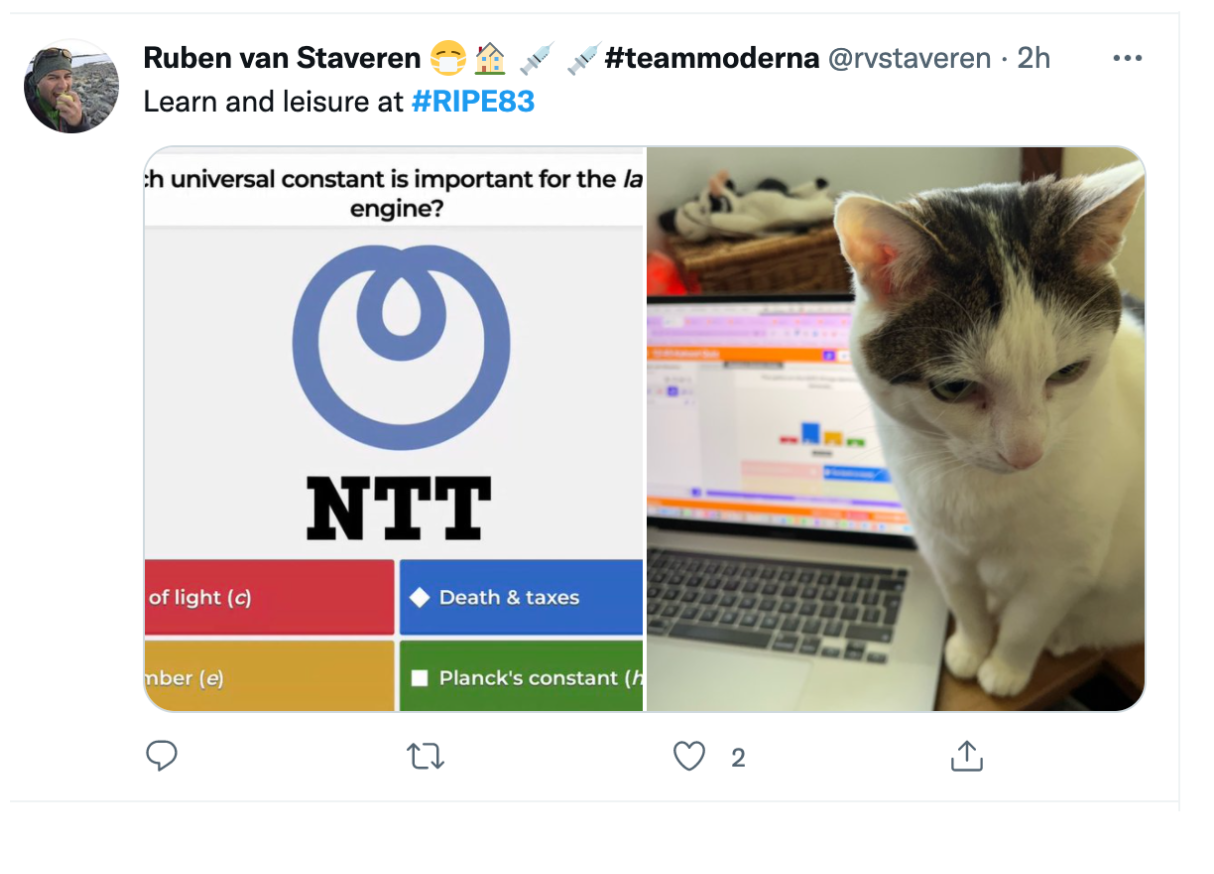
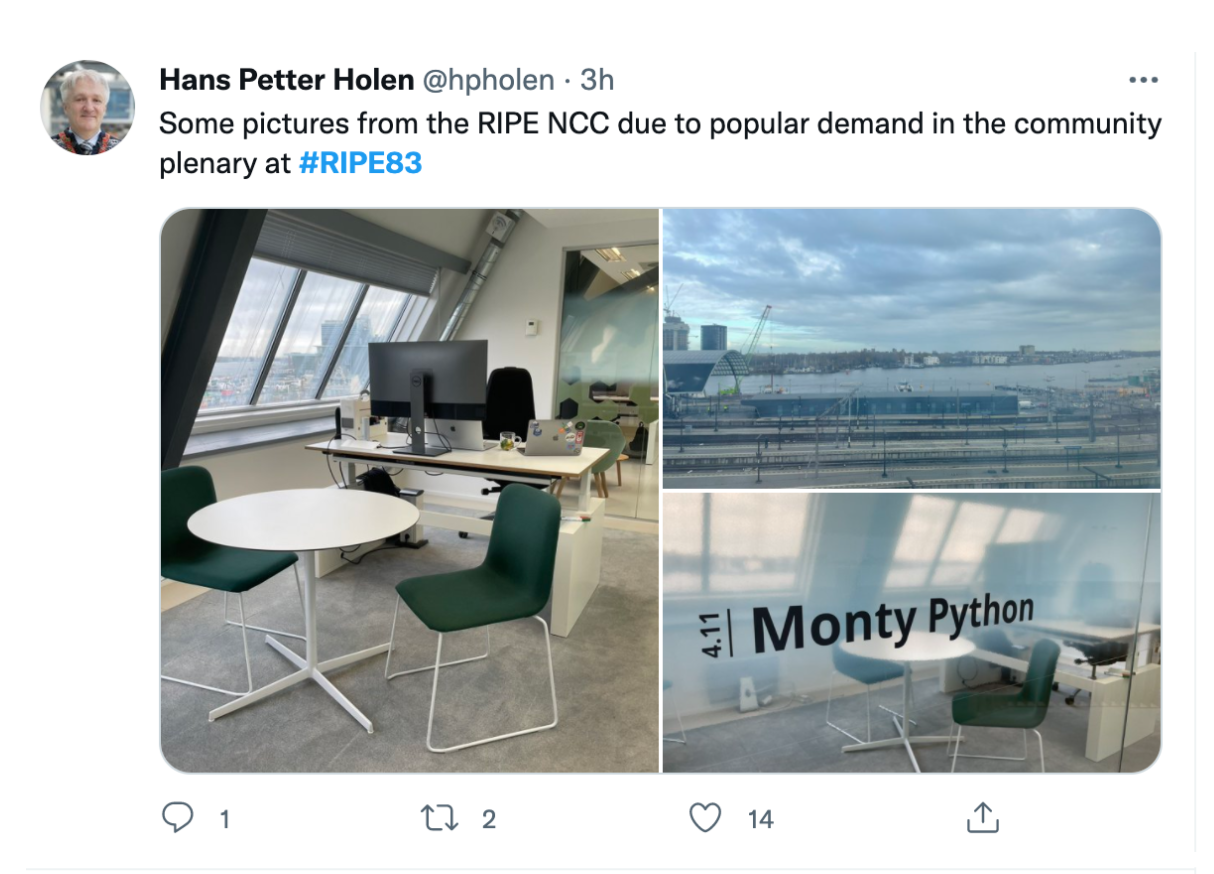
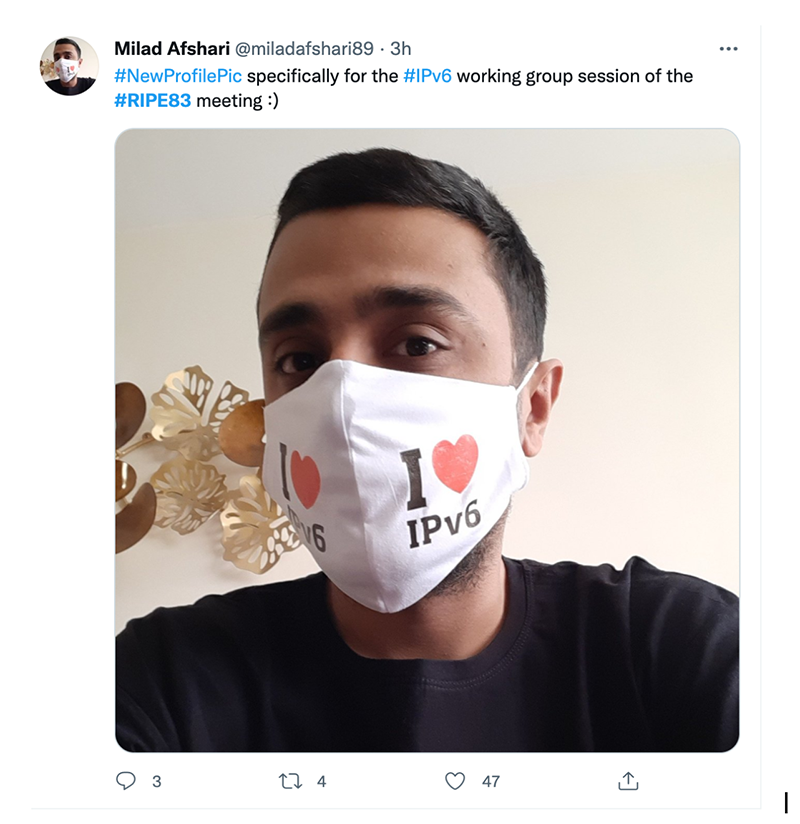
Friday, 26 November
We wrapped up the week with the last plenary session and the closing plenary.
Plenary
Brian Nisbet, RIPE Meeting Programme Committee Vice-Chair, announced that the two open spots of the Programme Committee would continue to be filled by existing members Dmitry Kohmanyuk and Alexander Azimov, and that there were no other candidates. He said he was happy to have them continue but hoped that more people would step forward next time in order to support the committee.
Perennial favourite Geoff Huston, APNIC, with an examination of the DNS’ “openness” according to various definitions. He argued that the Internet is all about the DNS these days and that a few massive companies have essentially taken over the DNS space, which no longer resembles the system as it was originally designed. His talk sparked a lot of questions about monopolies, the value of regulation and the future of the Internet.
Menno Schepers, RIPE NCC, presented the technical report from the meeting week and highlighted that the stenography stream is now IPv6-enabled, which means the RIPE Meeting website is now completely dual-stacked. How was your RIPE 83 experience? We want your feedback!
Brian thanked everyone for submitting their talks to the plenary and asked everyone to rate the talks they saw so that the RIPE Meeting Programme Committee can make future selections based on that feedback. He then closed the session expressing his hope that RIPE 84 would, finally, be a hybrid meeting.
Closing Plenary
RIPE Chair Mirjam Kühne closed the meeting by presenting some meeting statistics and changes in positions within the RIPE community. There were 1,126 registered participants in total, including 240 newcomers with an average of 450 participants per day.
She thanked outgoing RIPE Working Group Chairs Alireza Vaziri of Anti-Abuse and David Knight of DNS, and welcomed newly or re-elected chairs Bijal Sanghani of RIPE NCC Services, Achilleas Kemos and Johan Helsingius of Cooperation, Marcos Sanz of Open Source and Moritz Müller of DNS. She also thanked outgoing RIPE Meeting Programme Committee member Pavel Lunin and welcomed re-elected members Alexander Azimov and Dmitry Kohmanyuk. Finally, she thanked outgoing NRO NC representative Nurani Nimpuno and welcomed the newly elected representative Sander Steffann.
Finally, Mirjam thanked the RIPE NCC staff, and especially RIPE 83’s event organiser Alexandra Vos, for all of their work to set-up the meeting when a mysterious group of individuals seized control of the stream…
Our favourite tweets (and slides) of the day:

